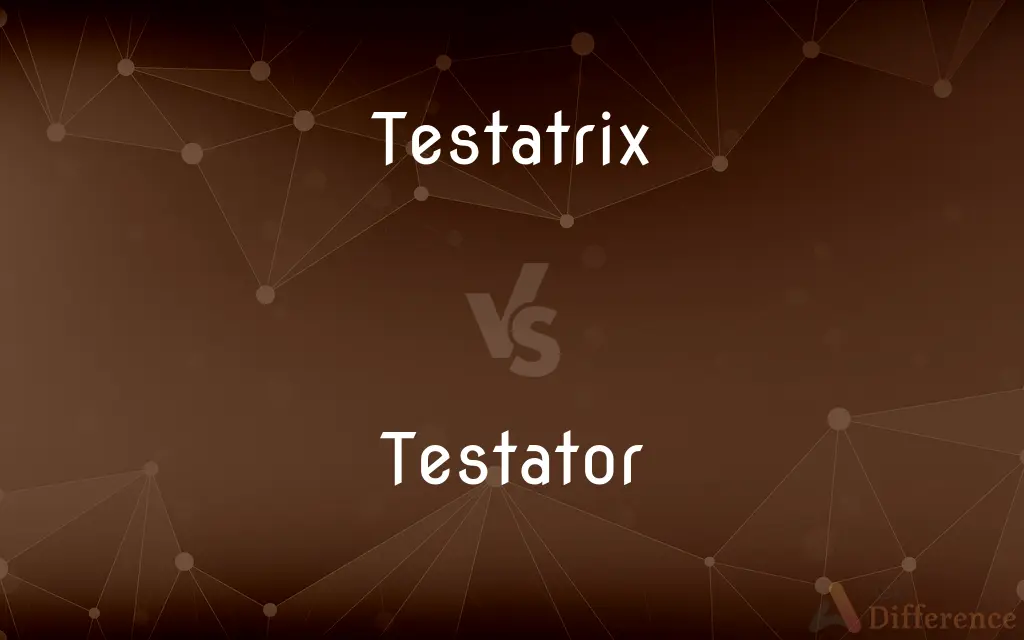Testatrix vs. Testator — What's the Difference?
By Fiza Rafique & Urooj Arif — Updated on March 6, 2024
Testatrix refers to a woman who has made a valid will, whereas a testator is a person (usually implying a man) who makes a will.

Difference Between Testatrix and Testator
Table of Contents
ADVERTISEMENT
Key Differences
A testatrix is specifically a female who creates a will to distribute her estate posthumously. This term emphasizes the gender of the individual making the will, highlighting the traditional gender distinctions in legal terminology. Whereas, a testator can refer to any person who makes a will, but historically, it has been more commonly used to describe males. This distinction reflects not just the legal action taken but also the gendered language of law.
The term testatrix comes from Latin, illustrating the legal profession's reliance on Latin terminology to convey specific meanings. It denotes a woman who has taken the legal steps to ensure her wishes are respected after her death. On the other hand, testator, also derived from Latin, is used more broadly and is less gender-specific in contemporary usage, although it has masculine origins.
In legal documents and in the context of estate planning, using the correct term (testatrix or testator) can clarify the subject’s gender. This can be particularly relevant in historical documents or in jurisdictions where legal language remains highly formalized. Whereas, in modern legal contexts, there's a move towards using gender-neutral language, with "testator" being used for individuals of any gender.
Estate laws apply equally to testatrices and testators, meaning the gender of the person does not affect the legal validity or the execution of the will. However, the distinction between the terms underscores the legal profession's evolving understanding of gender inclusivity and language precision.
Despite the differences in terms implying gender, both testatrices and testators have the same rights and responsibilities under the law. They must both ensure their wills are legally valid, clear, and reflective of their intentions for the distribution of their estates. This demonstrates how legal terminology evolves alongside societal changes, though its core principles remain anchored in ensuring individuals' wishes are honored after their death.
ADVERTISEMENT
Comparison Chart
Definition
A female who has made a will before her death.
A person (often implying male) who makes a will.
Gender
Female
Usually male, but can be gender-neutral.
Origin
Latin, specific to females.
Latin, historically male but now more inclusive.
Usage
More specific, highlighting the testator's gender
Broader, often used regardless of the testator's gender.
Legal Implication
No difference in legal standing or effect of the will.
Same legal validity and effect of the will as a testatrix.
Compare with Definitions
Testatrix
A woman who makes a will.
The testatrix outlined her estate's distribution to her children clearly in her will.
Testator
Person executing a will.
The testator named his daughter as the sole beneficiary of his estate.
Testatrix
A lady who specifies her last wishes in a document.
The testatrix left her prized possessions to her closest friends.
Testator
Declarant of a will.
The testator’s will included a surprise legacy to his alma mater.
Testatrix
Woman executing a testament.
The testatrix appointed her niece as the executor of her will.
Testator
A person who makes a will.
The testator took great care to detail his estate’s division among his heirs.
Testatrix
Female declarant of a will.
The testatrix's will was contested, but the court upheld her final wishes.
Testator
One who declares their last wishes in a will.
The testator’s generosity was evident in the charitable bequests made.
Testatrix
Female will-maker.
As a testatrix, she chose to donate a significant portion of her estate to charity.
Testator
Individual creating a testament.
As a testator, he left instructions for a scholarship fund in his name.
Testatrix
A deceased woman who has left a legally valid will.
Testator
A testator () is a person who has written and executed a last will and testament that is in effect at the time of his/her death.
Testatrix
(legal) A female testator.
Testator
A deceased person who has left a legally valid will.
Testatrix
A woman who makes and leaves a will at death; a female testator.
Testator
(legal) One who makes or has made a legally valid will.
Testatrix
A female testator
Testator
A man who makes and leaves a will, or testament, at death.
Testator
A person who makes a will
Common Curiosities
What is a testatrix?
A testatrix is a female who has made a legally binding will before her death.
Can a woman be called a testator?
Yes, in modern usage, "testator" can be gender-neutral and apply to a woman.
Do estate laws differ for testatrices and testators?
No, estate laws apply equally, regardless of the testator's gender.
How is a testatrix’s will validated?
Like any will, it must meet legal standards of validity, including the testatrix's clear intent and signature.
Is there a legal difference between a will made by a testatrix and a testator?
No, the legal validity and execution of a will do not depend on the gender of the person making it.
Why is the term testatrix less common today?
There's a trend towards using gender-neutral language in legal contexts, making "testator" more universally applicable.
What is the purpose of using gender-specific terms in wills?
Historically, it was to clarify the testator's gender, but modern practices are moving towards inclusivity.
Who is considered a testator?
A testator is a person, usually but not exclusively male, who has made a will.
Are the terms testatrix and testator interchangeable?
While both refer to individuals making a will, testatrix specifically denotes a female, making them not entirely interchangeable.
Why are there two different terms for people making wills?
The differentiation comes from traditional legal language, reflecting gender distinctions.
Can a testator be of any gender?
Yes, "testator" can refer to individuals of any gender making a will.
What happens if a testatrix or testator dies without a will?
Their estate is distributed according to the laws of intestacy, which do not consider the deceased's wishes.
How does one choose between using testatrix or testator?
It depends on the individual's preference and the context of the legal document.
Is the role of executor different when appointed by a testatrix or a testator?
No, the executor’s responsibilities remain the same, focusing on fulfilling the deceased's wishes as outlined in their will.
Are there any specific clauses unique to a testatrix’s will?
No, the content and clauses depend on the individual's wishes, not their gender.
Share Your Discovery

Previous Comparison
Vain vs. Pain
Next Comparison
Theory vs. ResearchAuthor Spotlight
Written by
Fiza RafiqueFiza Rafique is a skilled content writer at AskDifference.com, where she meticulously refines and enhances written pieces. Drawing from her vast editorial expertise, Fiza ensures clarity, accuracy, and precision in every article. Passionate about language, she continually seeks to elevate the quality of content for readers worldwide.
Co-written by
Urooj ArifUrooj is a skilled content writer at Ask Difference, known for her exceptional ability to simplify complex topics into engaging and informative content. With a passion for research and a flair for clear, concise writing, she consistently delivers articles that resonate with our diverse audience.















































